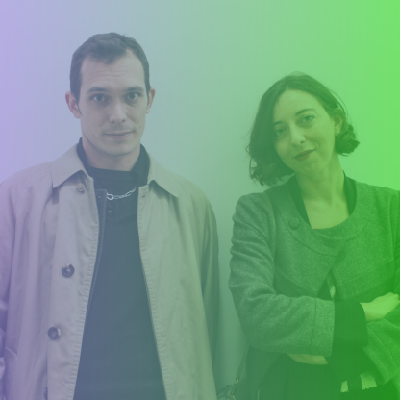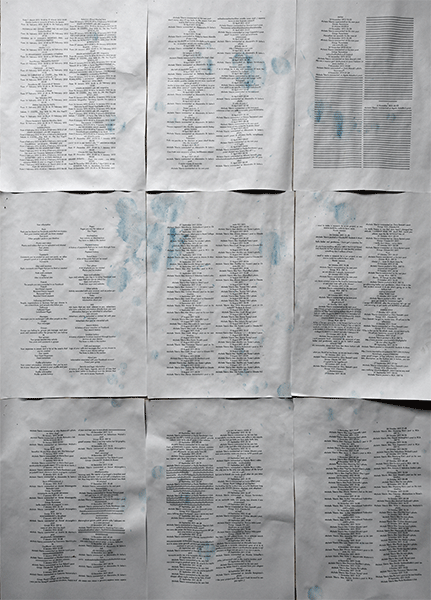
Michele Tiberio
8° WINNER
Interview
Before the contest, I had been discussing with Diletta Tonatto for a couple of months on the possibility to employ scents in an artwork. Our conversations eventually went out of track and weaved together. One day, we wondered whether our digital identities could have a scent. When I stumbled upon Re:Humanism, I found the opportunity to find an answer.
The initial spark was definitely the sense of smell. This has an irrational and fleshly quality. AI, on the other hand, turns out to be cold and almost transparent. We liked the idea to weave together two contexts apparently distant.
No, with social media developing further these two lives of ours will merge. Actually, they already are one thing. It’s just that we users haven’t realized this yet.
This is a question extremely easy to oversimplify: we cannot deny that we’re moving towards a digital world which increasingly resembles a panopticon – although a panopticon with mirror glasses – and there is a wide lack of awareness for the use of our own data. The experience we have in the virtual universe is still incomplete. It satisfies only our eyesight and hearing, since it is tied to the screen, having next to nothing for our other senses. These two are the senses we mainly use (rationally). Hence, the personal data we provide are their reflections. Nowadays, it is relatively easy to process and control these bits of information, which become in turn a way to control the users. In the last 10 years, we witnessed a trend to give away our privacy and personal data. But this can change: in China, people utterly gave up their privacy, but the government – especially in these critical times – could not guarantee their safety. This is giving rise to feeble protests, a sign that we can reverse the trend. If we could get back all our senses, our carnality, our instincts which make us animals, we could hinder the deliberate use of our data. It could allow us to gain independence from the screen, which is not necessarily a refusal, but an aware and independent use. I consider AI as the sixth sense of the homo sapiens, but it should not be his primary sense. Otherwise, it is possible that in 20 years, talks of privacy would not make sense anymore. We could choose new paths and the digital world will guide us through our lives. Maybe it will not be our life as such, but it will be simpler. Culture, society, and geography have a solid influence in the possible future scenarios. The topic is very complex and should be developed.
Michele Tiberio - "Me, My scent" - ReHumanism Art Prize
Biography
Born in Palermo in 1987, Tiberio studied photography and design in Italy and then continued his studies at the Royal College of Art and Imperial College of London in the United Kingdom. He began his career as a designer and engineer before dedicating himself fully to sculpture and installations. Tiberio has exhibited in Rome, Palermo, and London. His works have been included in exhibitions at the Welcome Collection in London, Palazzo Constantino in Palermo, and the Istituto di Cultura Austriaco in Rome. In 2017 he had his solo show at Francesco Pantaleone Arte Contemporanea. His last project, conceived with Niccoló De Napoli, is “Misconception: a way to misunderstand reality”, it had been part of the Manifesta 12 Collaterals in Palermo. Michel Tiberio has been selected by the Fondazione Merz for Meteore in Giardino, 2019, that will take place in Turin in summer.
Website: micheletiberio.com
"Me, My scent"

For the Re-humanism competition I want to propose the work “Me, My Scent”. The work is a sculptural work made by a visible component and an invisible component. A large searchable book placed on a lectern keeps all traces of my digital identity inside, but the book also emanates a scent: the scent of my digital identity, created by an artificial intelligence. The book that composes the work, is a book where I collected all the traces of my digital identity: I requested all my data collected from technology companies (Facebook, Instagram, LinkedIn, Google, iPhone, etc.etc.) And I entered a large paper volume, freely available to anyone who wants. Without any censorship and without any cuts private messages, photos, likes, pages visited and searches, become visible and public to anyone approaching. This volume represents in physical form a trace of my digital identity, in its heavy and cumbersome materiality: more than 1500 pages go to compose an incredibly precise profile of a me that existed only in the network, influenced by the physical world and that, at its time, it influences the physical world. This cataloging work immediately reveals how the data collected on each one of us are not complex abstract information to be deciphered: they are words and opinions, photographs and preferences that anyone who has the opportunity to buy or collect on the web can use, as well as anyone want to browse the work can access all the information about me (or my digital ego?).
